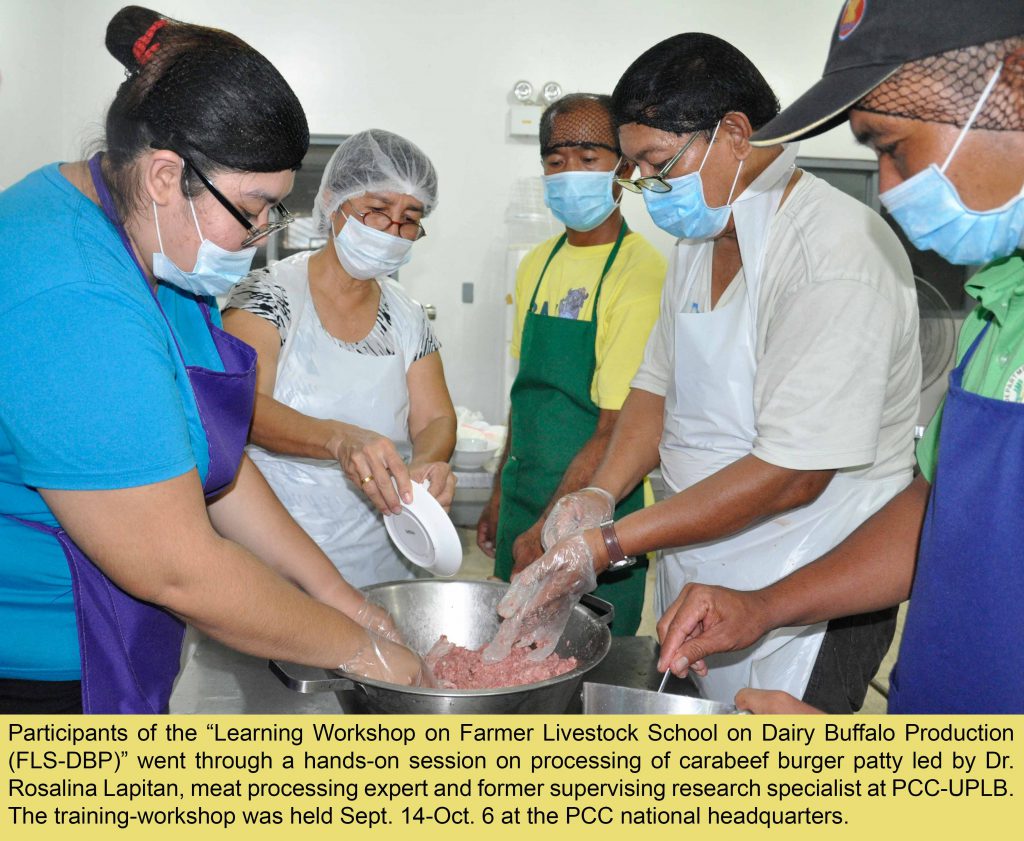A group comprising 15 individuals recently underwent a three-week training preparatory to the piloting of a study titled “Farmer Livestock School on Dairy Buffalo Production (FLS-DBP)”, which is part of a three-year research project of the Philippine Carabao Center (PCC).
Those who completed the training were six dairy farmers, one village-based artificial insemination technician (VBAIT), four extension workers and four PCC staff from Nueva Ecija and Ilocos Norte.
They are Melchor Correa, Eliseo C. Mislang, Freddie P. Carlos, Allan O. Dayag, Lumicio DC. Magtalas, Teody G. Nieva, Arnolfo B. Corpuz, Geneveve V. Suliva, Ailin E. Battad, Daniel De Vera, Gina G. Tuquero, Catherine P. Dabalos, Hannah Lois C. Paraoan, Estella P. Valiente and Ma. Theresa R. Sawit, respectively.
Titled “Learning Workshop on FLS-DBP”, the activity was held at the PCC national headquarters and gene pool in the Science City of Muñoz in Nueva Ecija on September 14 to October 6.
According to Erwin Valiente, one of the FLS-DBP researchers, the training module, which was developed by a team of experts from various PCC operating units, consisted of six courses, namely, preparing facilitators for FLS Implementation, mobilizing communities for FLS, raising healthy and productive dairy buffalo, building enterprises from buffalo, participatory technology, and participatory tools to measure FLS effects and impacts.
“The training module was developed with assistance from Marie Alo, supervising science research specialist of the Philippine Council for Agriculture, Aquatic and Natural Resources Research Development (PCAARRD),” Valiente added.
PCAARRD is assisting PCC in the FLS-DBP study, which is one of two studies under the agency’s research project titled “Extension Methods for Adoption of Dairy Buffalo Technology in Selected Barangays in Nueva Ecija and Ilocos Norte.”
According to Dr. Eric Palacpac, project leader, the research is primarily aimed at developing extension modalities for the holistic delivery of extension services and strengthening technology adoption among village-based dairy buffalo farmers.
The other study involves the mobilization of a mobile team of communicators of innovations.
“The PCC has trained 15 individuals recently to have pilot trainers on FLS-DBP. They will serve as trainers and/or facilitators to other farmers in selected barangays in Nueva Ecija and Ilocos Norte with incentives,” he explained.
“Moreover, the FLS training proper will actually start early next year. The fifteen individuals will be separated into three teams having five members for each team,” he said.
Team One will be composed of Correa, Mislang, Carlos, Tuquero and Sawit; Team Two will be made up of Dayag, Magtalas, Nieva, De Vera and Valiente, and Team Three will be composed of Corpuz, Suliva, Battad, Dabalos and Paraoan. They will teach FLS-DBP in San Jose City, Guimba and Talugtug, Nueva Ecija and in Ilocos Norte, respectively.
“The FLS is actually a school without walls. It is a participatory, hands-on, interactive, experiential adult learning and decision-making approach engaged in by a group of farmers in a training program and conducted right in the farmers’ field or locality,” Palacpac further explained.

